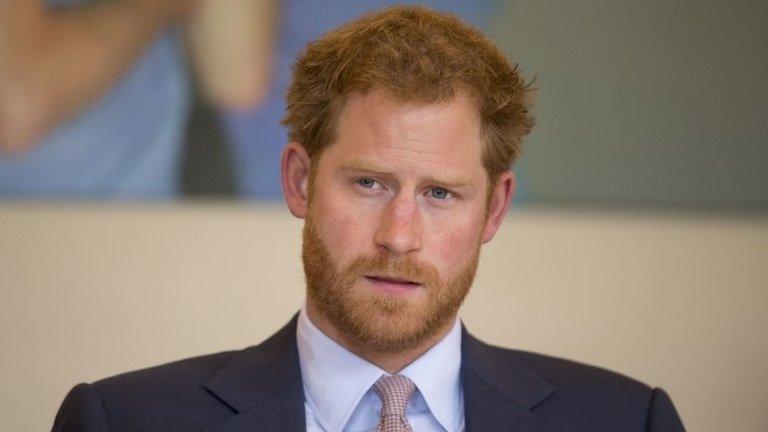Duke of Sussex: The party prince who carved his own path
- Published
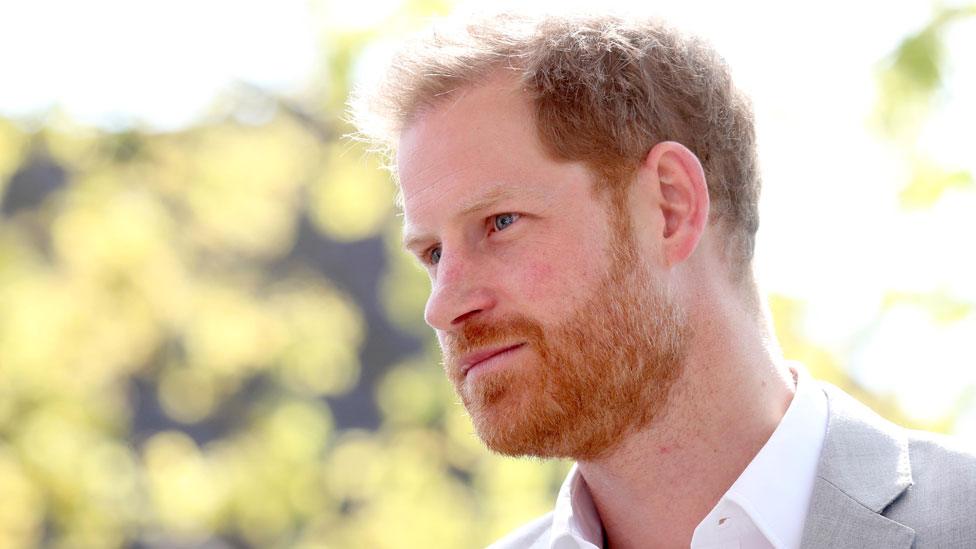
The Duke of Sussex grew up in the media spotlight - from a young royal dealing with his mother's death, through his partying teenage years, to his career in the military.
Since then Harry has followed in his mother's footsteps, doing charity work across the globe. He has got married and become a father.
Now he and the Duchess of Sussex have begun a new chapter: giving up their royal duties, HRH titles and public funding and living in California.
Harry has tried to balance his public and private lives. At times, the publicity that comes with being sixth in line to the throne has helped him to bolster support for his charitable endeavours. But there have also been times when that attention has become too much, and he has fought fiercely for his family's privacy.
Young life
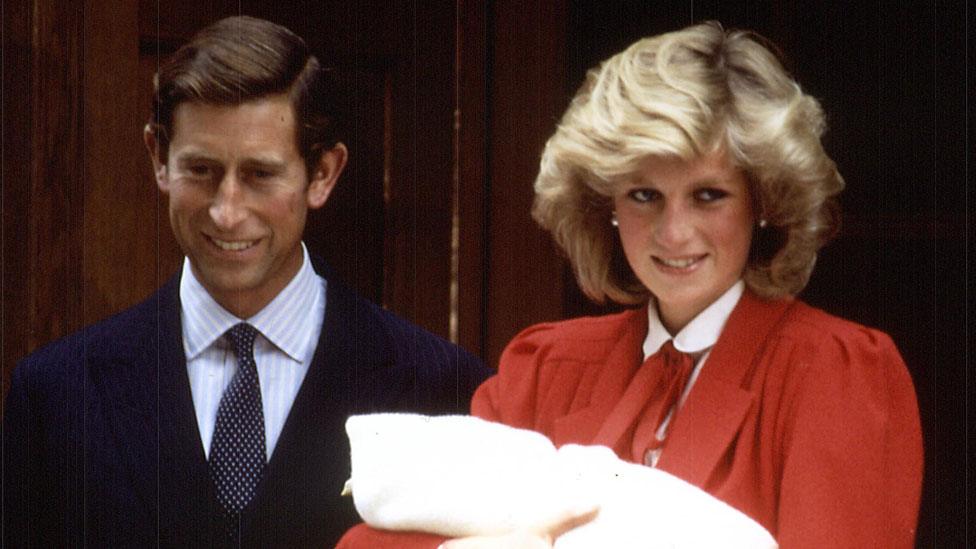
Prince Harry was born in 1984, the second child of the Prince and Princess of Wales
Born at St Mary's Hospital, Paddington, on 15 September 1984, the prince was christened Henry Charles Albert David by the Archbishop of Canterbury in December of that year in St George's Chapel, Windsor.
But it was officially announced from the start of his life that he would be known as Harry.
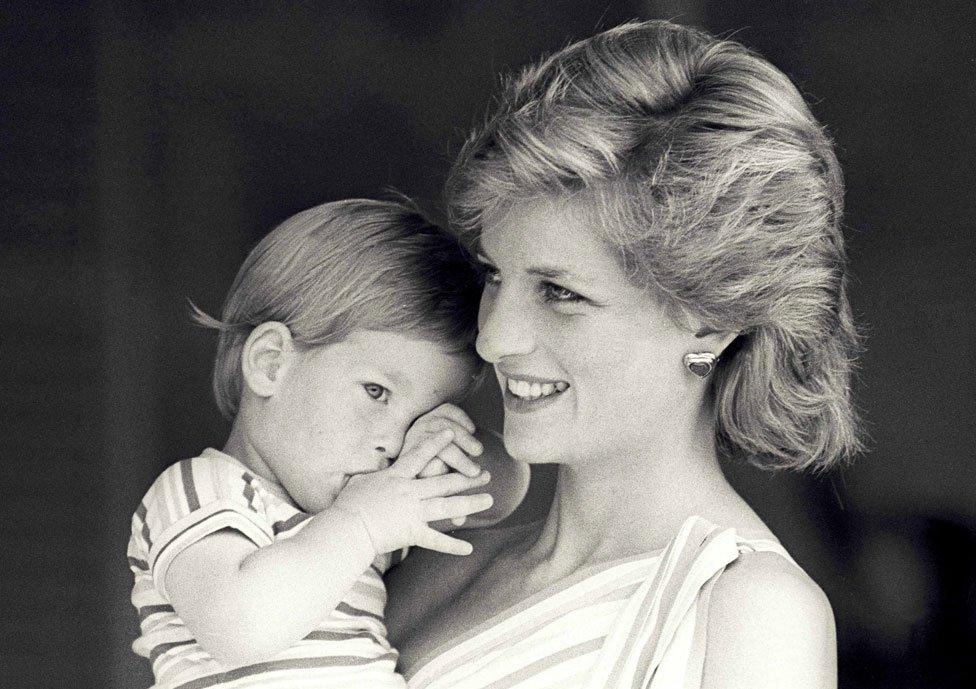
Although christened Henry, he has always been known as Harry

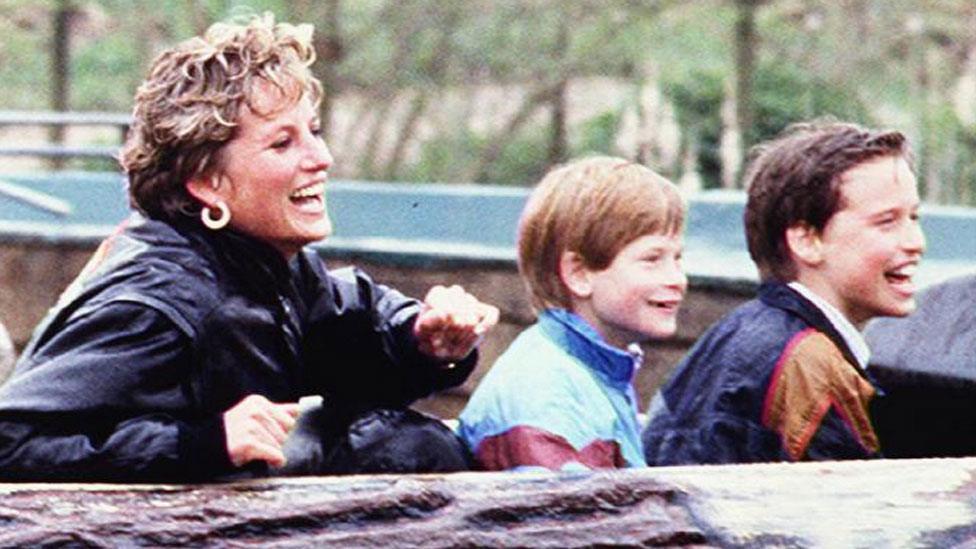
Harry with his mother and brother on a trip to Thorpe Park in 1993
The prince's childhood was cut short when his mother died in 1997.
Princess Diana was killed in a crash in Paris, aged 36, as the car she was in sped through a tunnel followed by paparazzi photographers.
Her death shook royal fans the world over, but it was 12-year-old Harry and 15-year-old William whose lives changed forever.
The funeral, which featured the image of the boys walking behind their mother's hearse to attend the service at Westminster Abbey, remains one of the most-watched programmes on the BBC.
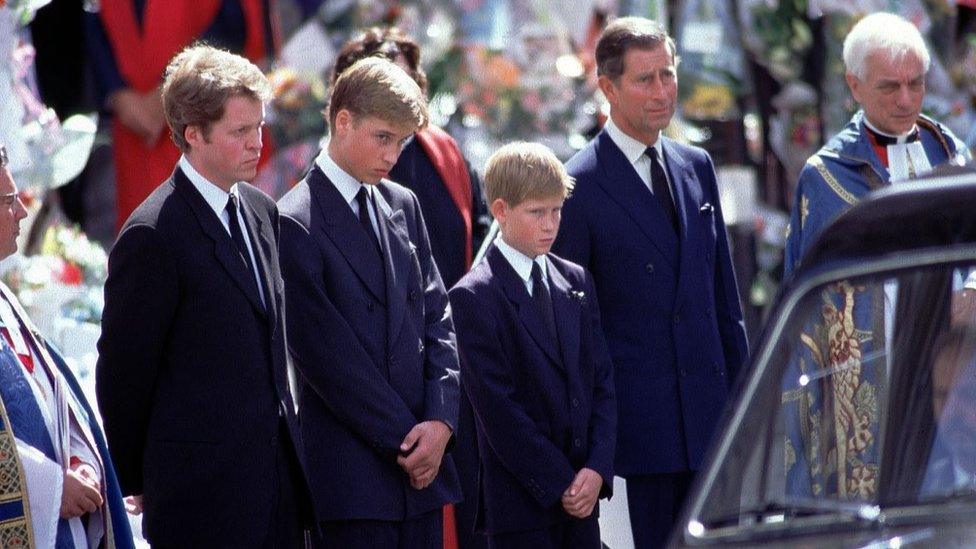
Prince Harry stood between his father, Prince Charles, and his older brother, Prince William, as they watched the hearse carry Diana's coffin
"I can safely say that losing my mum at the age of 12, and therefore shutting down all of my emotions for the last 20 years, has had a quite serious effect on not only my personal life but my work as well," the prince said in an interview with the Daily Telegraph, external in 2017.
He added: "I have probably been very close to a complete breakdown on numerous occasions when all sorts of grief and all sorts of lies and misconceptions and everything are coming to you from every angle."
The prince followed the educational path of his older brother William, at Wetherby School in Notting Hill, before entering Eton in 1998.
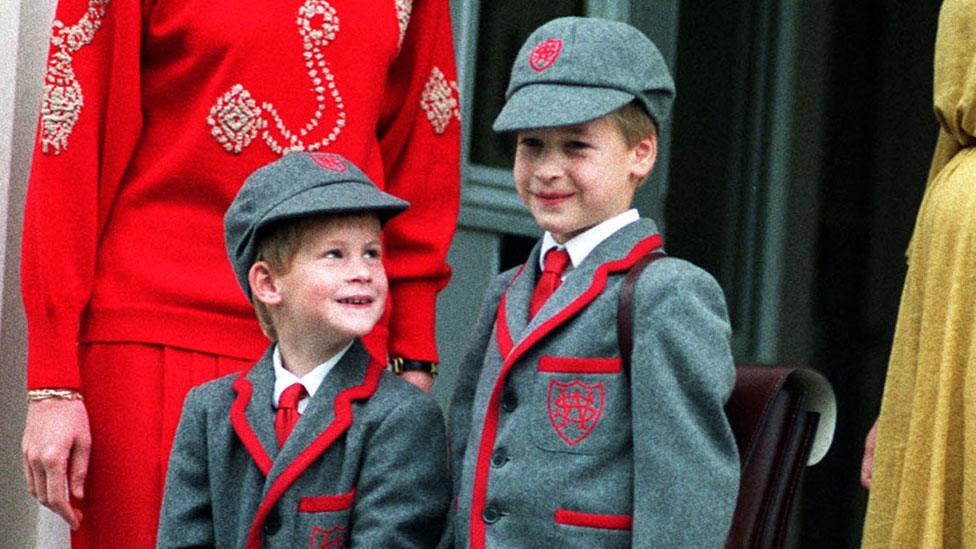
Harry, five, on his first day at Wetherby School, Notting Hill
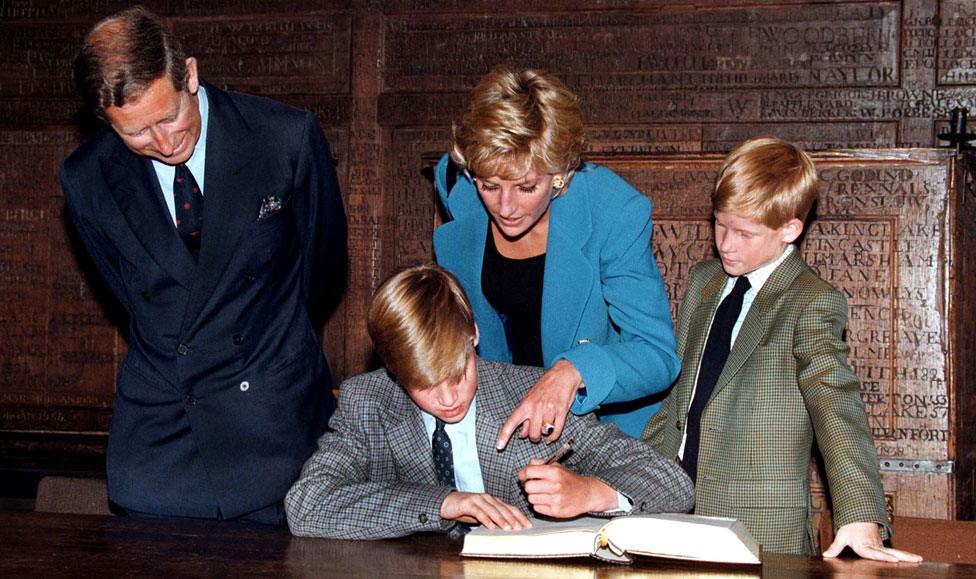
Prince Harry watching his brother sign the Eton College entrance book in 1995 - he would follow in his footsteps, joining the school three years later
After leaving Eton with two A-levels in 2003, Harry took a gap year.
He worked on a sheep farm in Australia and with Aids orphans in Lesotho, paving the way for the charity he later set up there.
Life in the spotlight
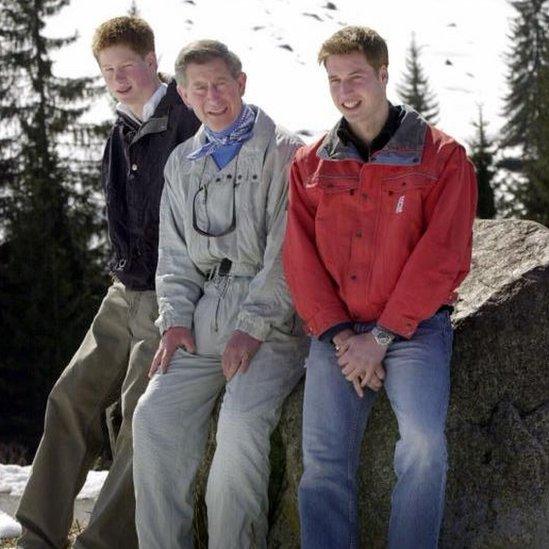
Prince Charles took his sons on annual skiing holidays to Switzerland

Attention from the press has been a constant in Harry's life.
The front page of a 2002 edition of the (now defunct) News of the World roared: "Harry's drugs shame", and claimed Prince Charles sent his son to visit a rehab clinic as punishment for smoking cannabis.
St James's Palace confirmed the then 17-year-old had "experimented with the drug on several occasions" but said the use was not "regular".
Then in October 2004, there was a scuffle with a photographer outside a club.
A royal spokesman said at the time the 20-year-old prince was hit in the face by a camera "when photographers crowded around him".
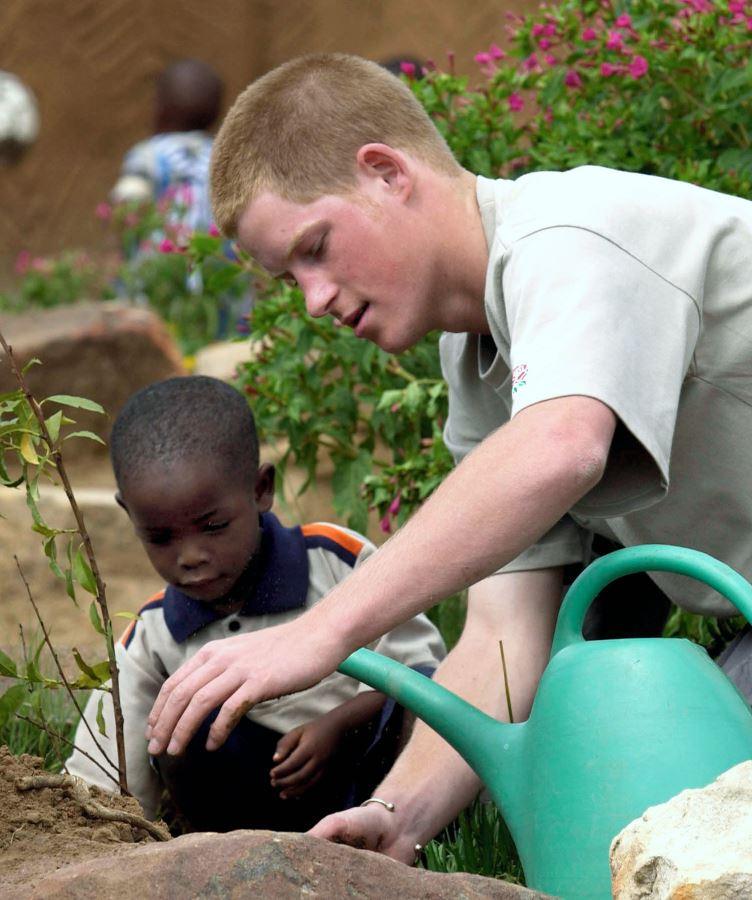
As part of his gap year, Prince Harry spent time at an orphanage in Lesotho, in southern Africa

When Harry pushed the camera away, "it's understood that a photographer's lip was cut", the spokesman added.
The following year, an image of the prince dressed as a Nazi at a fancy dress party sparked outrage.
Clarence House later said the prince had apologised for any "offence or embarrassment" caused and had realised "it was a poor choice of costume".
And in 2009, video footage emerged of Harry using offensive language to describe an Asian member of his Army platoon.
St James's Palace said the prince was "extremely sorry for any offence his words might cause" but said he had "used the term without any malice and as a nickname about a highly popular member of his platoon".
Harry enjoyed lighter-hearted press coverage during the London 2012 Olympic Games, in his role as an Olympic ambassador.
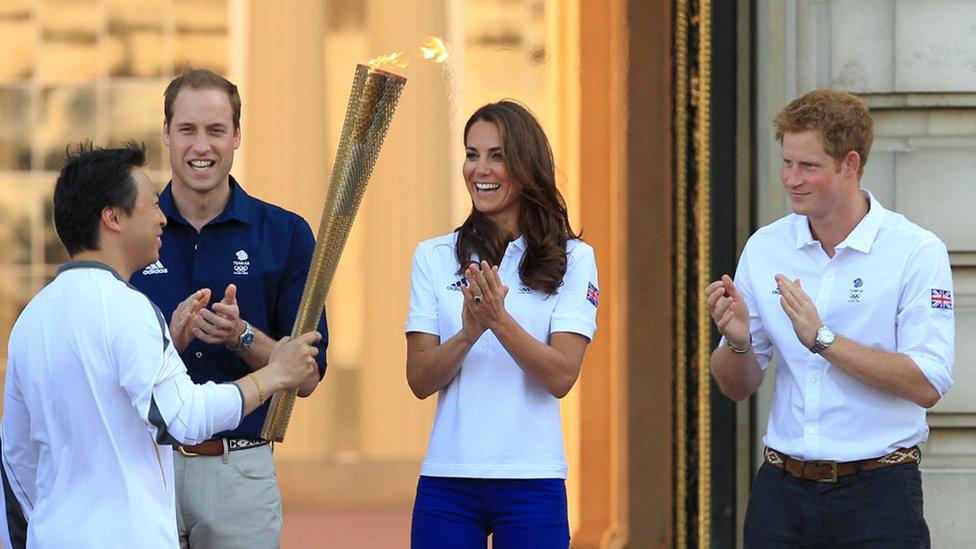
The prince was an Olympic ambassador at the London 2012 Games
In the same year he spent a lot of time in front of the cameras for the Queen's Jubilee. As part of those celebrations Harry completed his first royal solo tour overseas with visits to Belize, the Bahamas, Brazil and Jamaica.
However, that August, photos emerged of the prince and a young woman naked in a Las Vegas hotel room.
The two photos, published on US gossip website TMZ and later in the Sun newspaper, were taken on a private break with friends, with the site reporting the prince was in a group playing "strip billiards".
He later said he had "probably let myself down" but added: "I was in a private area and there should have been a certain amount of privacy that one should expect."
There is, however, a saving grace to the scrapes Harry has found himself in.
As the younger brother to the expected future king, Harry has relatively little responsibility.
Like the Queen's sister, Princess Margaret, and Prince Charles's younger siblings, Harry is a "spare to the heir" - and a world away from the throne.
So Harry's indiscretions have done little to dent public opinion of him.
And he has perhaps had a freer existence because of it; security worries would have made active service in Afghanistan impossible for his older brother, for example.
Army and charity
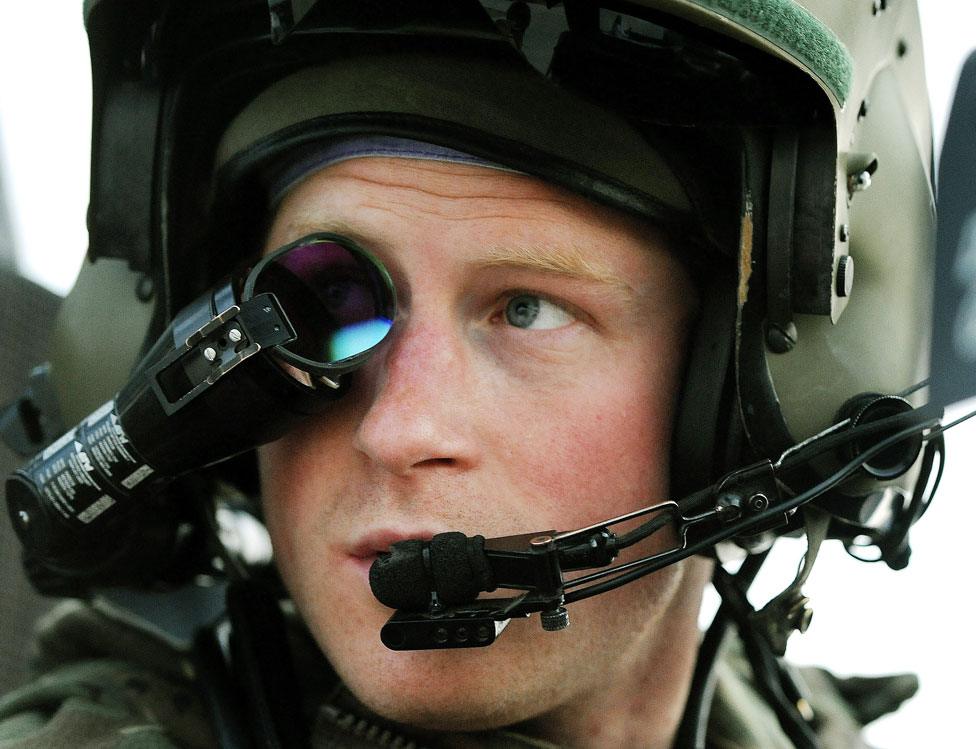
Harry served a tour in Afghanistan as an Apache helicopter pilot

Harry spent 10 years in the armed forces, becoming the first royal in more than 25 years to serve in a war zone.
He was left disappointed in 2007 when Army chiefs decided not to send him to Iraq because of "unacceptable risks", but later spent 10 weeks serving in Afghanistan in 2008.
Harry returned to the country as an Apache helicopter pilot from September 2012 to January 2013, before qualifying as an Apache commander in July 2013.
He later described how he had shot at Taliban insurgents, and said that being in Afghanistan was "as normal as it's going to get" for him.
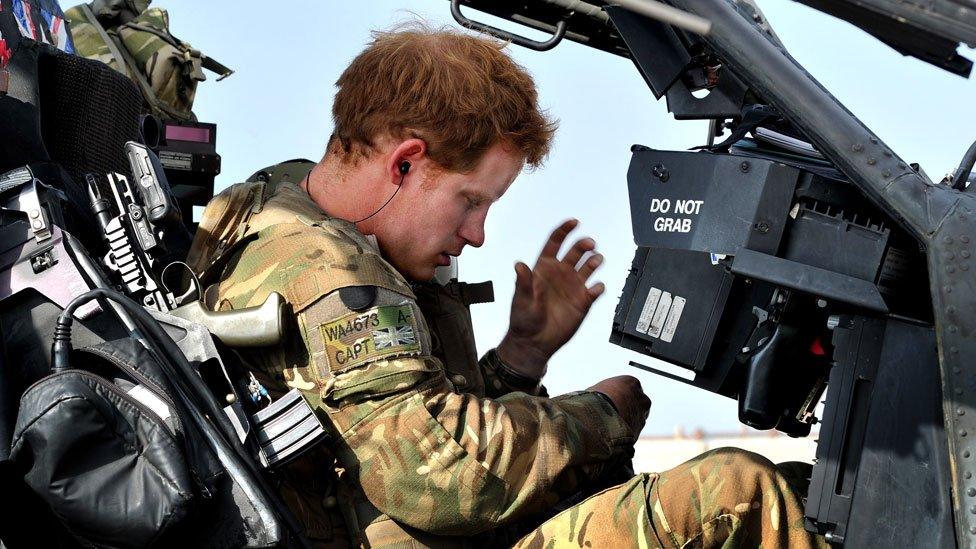
The prince said quitting the Army had been a "really tough decision"
When he announced he would be leaving the Army in 2015, the prince said his time in the military would "stay with me for the rest of my life".
This is reflected in his charity work, which mostly concentrates on mental health and helping service veterans.
Harry's most notable charity work so far is his founding and chairing of the Invictus Games in 2014.
The Paralympic-style international competition for injured ex-service personnel has been held in London, Orlando, Toronto and Sydney.
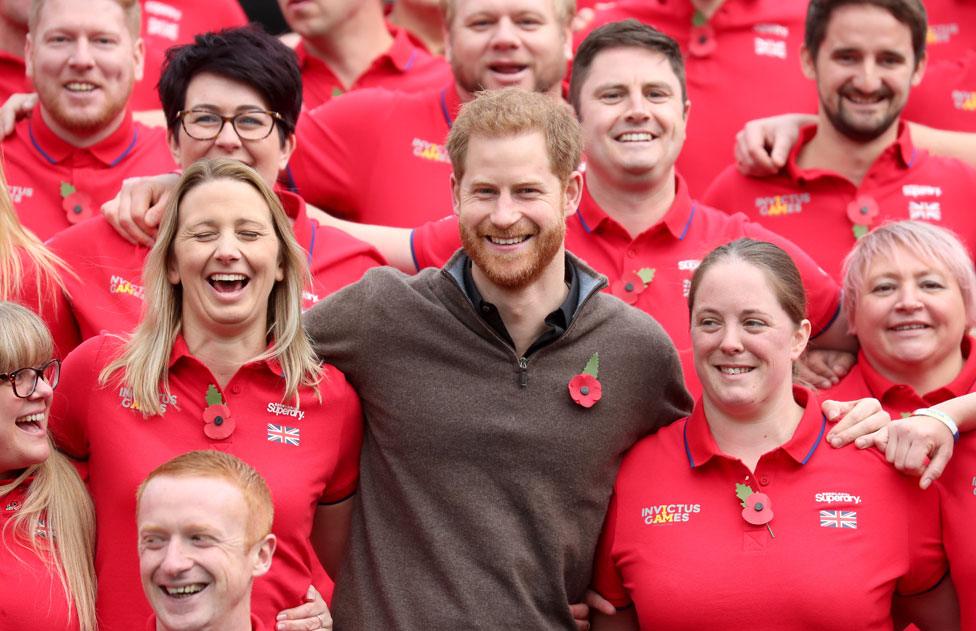
The prince has been the driving force behind the Invictus Games
He has also supported the charity Walking With the Wounded, for injured veterans.
The prince's other charity work includes supporting conservation projects in Africa and jointly founding Sentebale, a charity to help orphans in Lesotho.
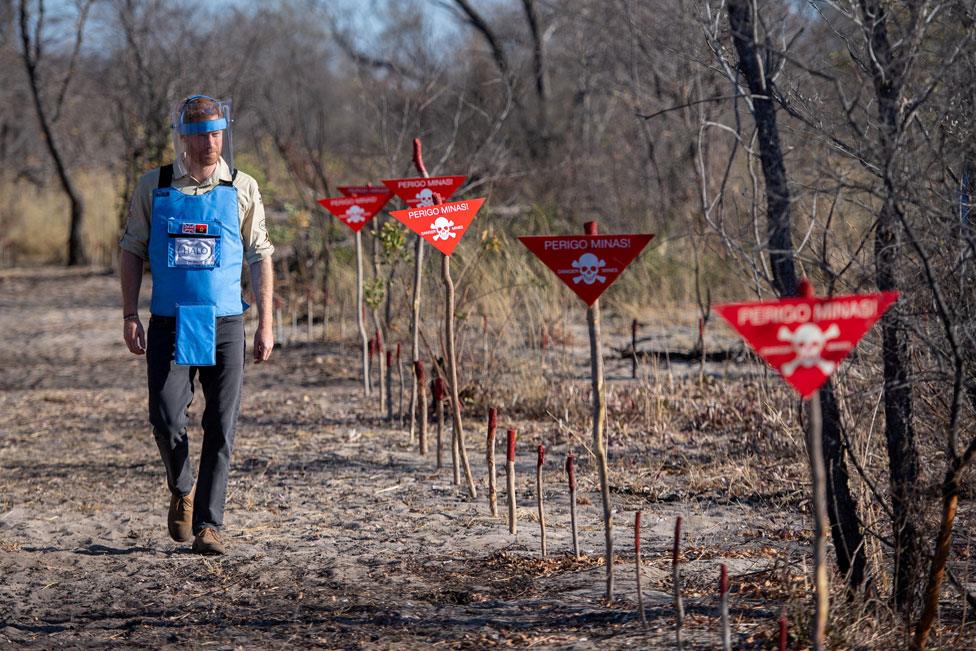
On his visit to Angola in September, Harry said landmines are "an unhealed scar of war"
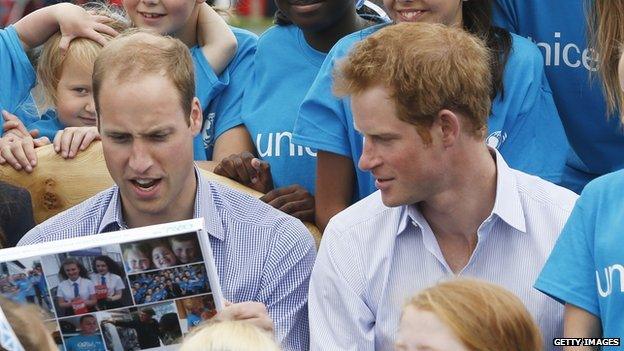
Harry and his brother William have worked together on various charity initiatives
He has continued his mother's work helping children affected by HIV and Aids, and supporting the Halo Trust's work in clearing landmines.
Diana captured global attention when she walked through a live minefield in central Angola in 1997.
She died in Paris later that year, before seeing the full impact of her visit - such as the signing of an international treaty to outlaw the weapons - but Harry highlighted her achievements when he retraced her steps in September 2019.
Tackling stigma
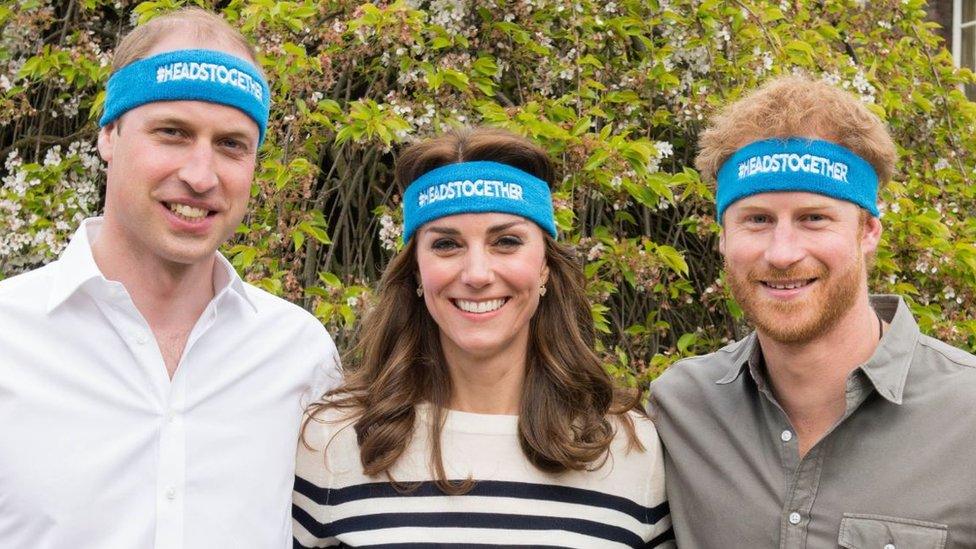
Prince Harry and the Duke and Duchess of Cambridge supported Heads Together runners at the London Marathon in 2017
In later years, Harry has had counselling to help him deal with his mother's death.
He was best man at his brother William's wedding in April 2011, and has since spoken of how hard it was not to have Diana there.
In a candid interview with the Daily Telegraph, external, he described shutting down all of his emotions for nearly 20 years and refusing to thinking about his mother.
This, he said, had a "quite serious effect" on his personal life and his work, and brought him close to a breakdown "on numerous occasions".
He also said he would probably regret "for the rest of his life" how brief his last phone call with his mother was, and spoke of her "fun" parenting. She was a "total kid through and through", he said.
Harry, William and the Duchess of Cambridge joined forces to focus their campaigning efforts on mental health.
They founded Heads Together, which aims to tackle stigma and fundraise for new support services.
'Beautiful surprise'
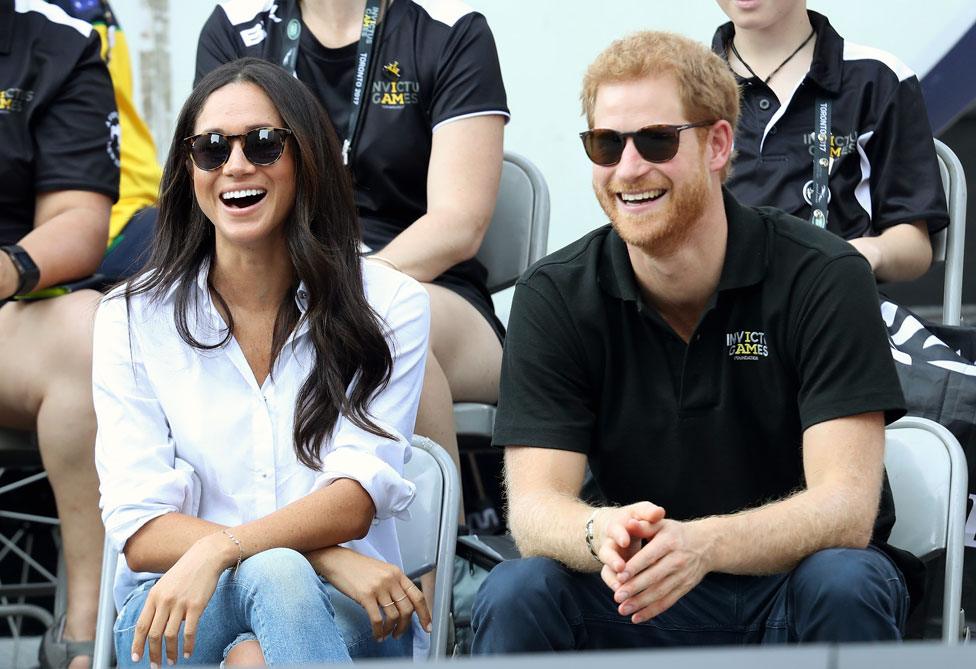
Prince Harry and Meghan Markle were first pictured together at the Invictus Games in 2017
As one of the world's most high-profile bachelors, Harry's love life has drawn much interest over the years.
In late 2016, he confirmed a new relationship with US actor, Meghan Markle, while issuing a statement, external accusing journalists of harassing her.
He described "nightly legal battles to keep defamatory stories out of papers", attempts by reporters and photographers to get into her home and the "bombardment" of nearly every friend and loved one in her life.
The pair had met on a blind date, organised by a mutual friend. Then after just two dates, they went on holiday together to Botswana.
In September 2017, the year before their wedding, Meghan told Vanity Fair magazine she and Harry were "two people who are really happy and in love, external".
And in an interview that November, when their engagement was announced, Harry admitted he had never heard of Meghan before his friend introduced them, and was "beautifully surprised".
He designed the engagement ring for Meghan, including two diamonds from his mother's jewellery collection.
The couple married in May 2018 at a ceremony at St George's Chapel in Windsor, and consequently became known as the Duke and Duchess of Sussex.
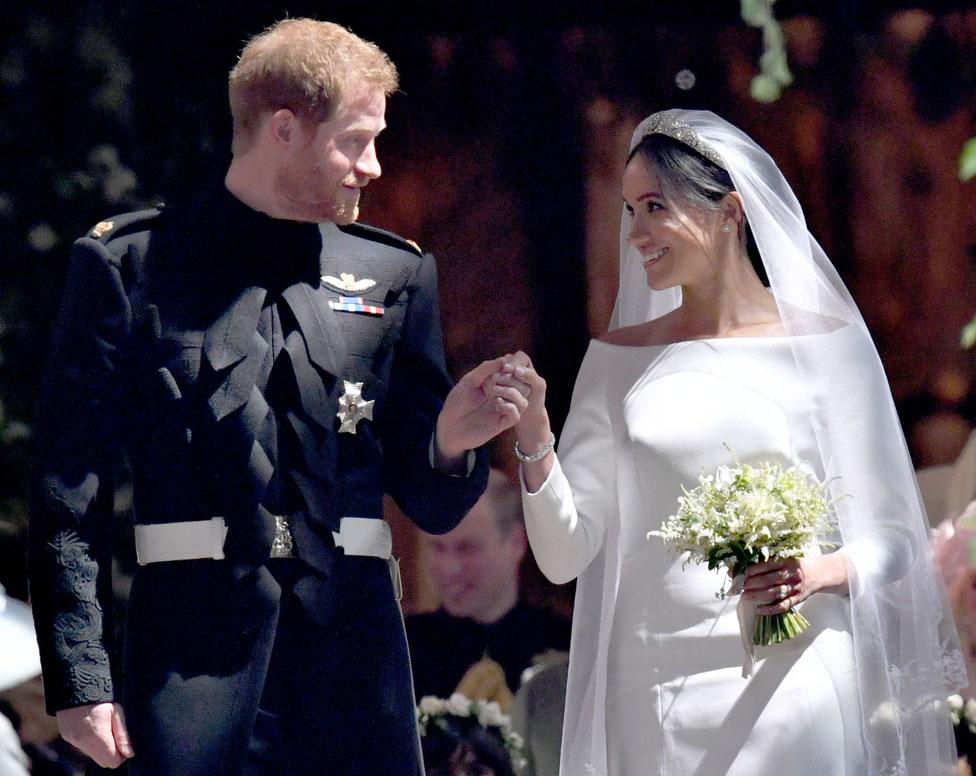

On a 16-day tour of Australia that October, the duke and duchess announced they were expecting their first child, adding that they were happy to share the "personal joy" of their news.
Baby Archie, described by Harry as "our own little bundle of joy", was born on 6 May 2019.
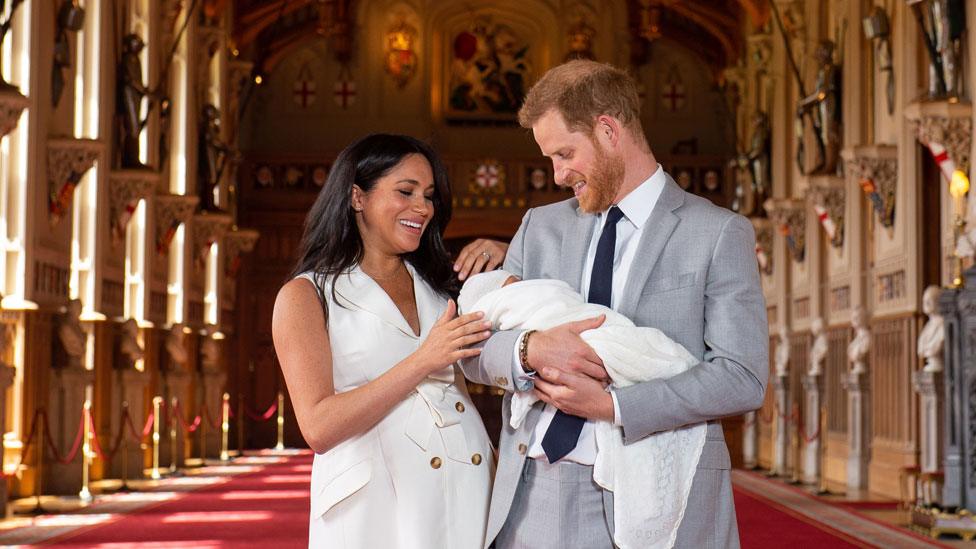
Prince Harry said he was "absolutely thrilled" with the birth of his first child, Archie
The next chapter
The duke's past few years have been a rollercoaster ride of highs and lows.
In 2019, he and his wife split their household office from that of the Duke and Duchess of Cambridge and the subsequent launch of the Sussexes' Instagram account amassed more than one million followers in record-breaking time (five hours and 45 minutes).
The joy of becoming parents was followed days later by news Harry had accepted damages and an apology from a paparazzi agency that had used a helicopter to take photographs of his home in the Cotswolds.
In June, the Sussexes announced they would split from the charity they shared with the Cambridges - fuelling speculation of a rift between brothers Harry and William.
Prince Harry on his brother, William in 2019: "We are certainly on different paths at the moment"
A 10-day tour of Africa at the end of September 2019 started well.
Harry raised awareness for causes close to his heart, and the couple introduced Archie to anti-apartheid campaigner Archbishop Desmond Tutu.
But during the tour, the Duchess of Sussex launched legal action against the Mail on Sunday over a claim that it unlawfully published one of her private letters.
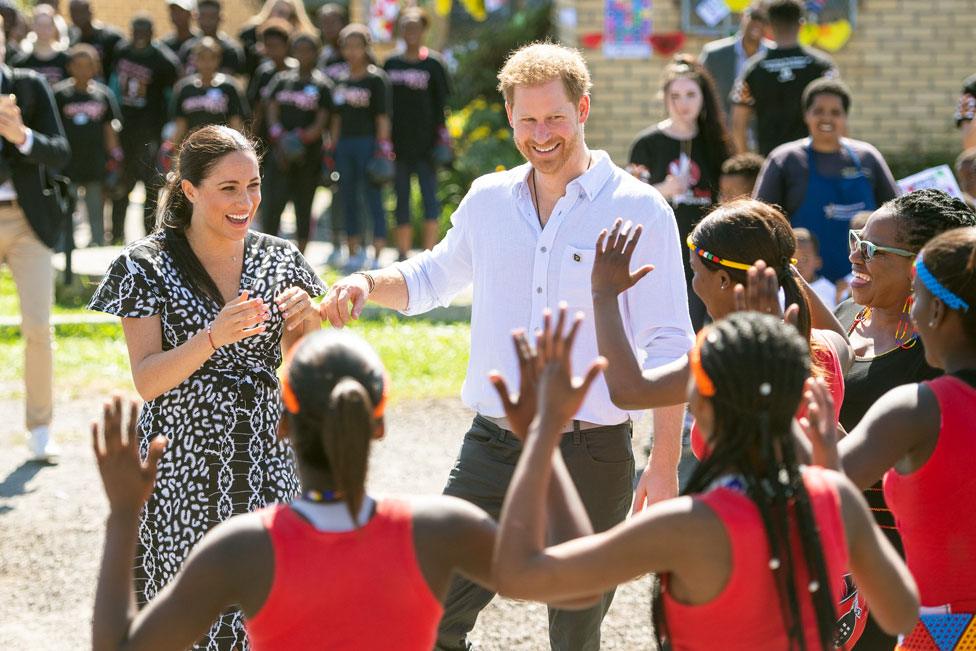
The duke and duchess went on a 10-day tour of Africa in September 2019
In a lengthy statement Harry said "positive" coverage of the tour of Africa had exposed the "double standards" of the "press pack that has vilified [the duchess] almost daily for the past nine months".
And in an ITV documentary, filmed during the tour and broadcast the following month, the duchess admitted she was struggling to adjust to royal life, while the duke said his mental health was a matter of "constant management".
Then, at the start of 2020, the couple made a bombshell announcement that they would be stepping back as senior royals.
Later, Harry would tell host James Corden that the decision to step back was taken to protect himself and his family from the "toxic" situation created by the UK press.
Their difficult relationship with the UK press saw both Harry and Meghan take legal action against publishers, as well as cutting ties with tabloid newspapers.
After a brief stint in Canada, the couple now lives in California and are expecting their second child.
The duke has since spoken out on several issues, including on structural racism, human rights and unconscious bias.
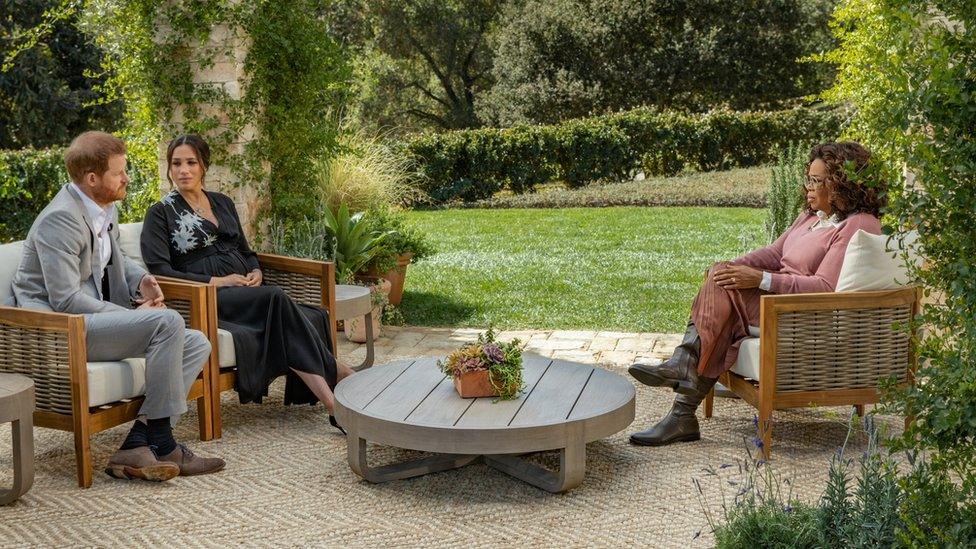
The duke and duchess gave an interview with Oprah, who went to their wedding
And the couple have signed deals to make shows and podcasts with Netflix and Spotify.
His charity work continues - although he has returned his military appointments and royal patronages. Buckingham Palace said he and Meghan will keep their "private patronages and associations".
He told interviewer Corden that his "life is always going to be about public service". But much of the rest of his future - including how he will continue to carve his own path - remains unclear.
- Published8 January 2020
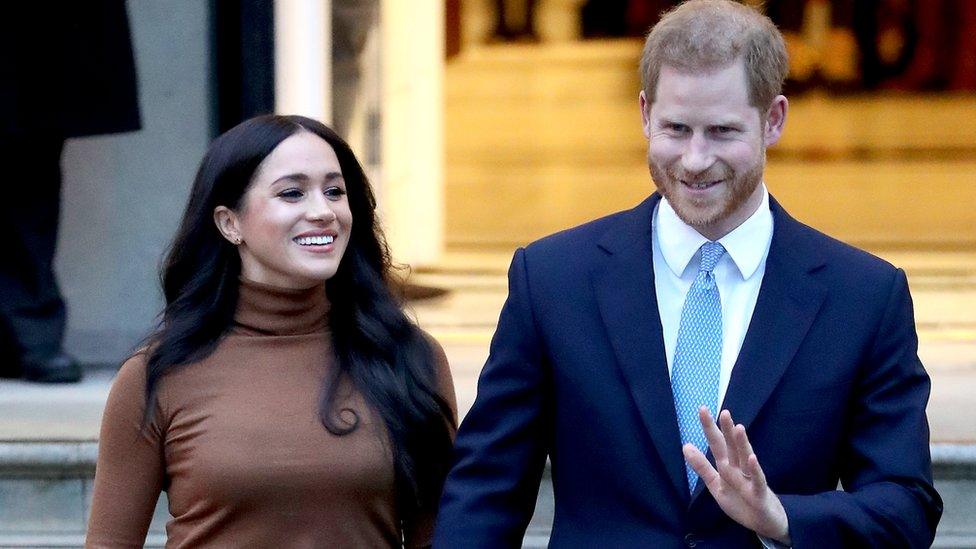
- Published17 April 2017
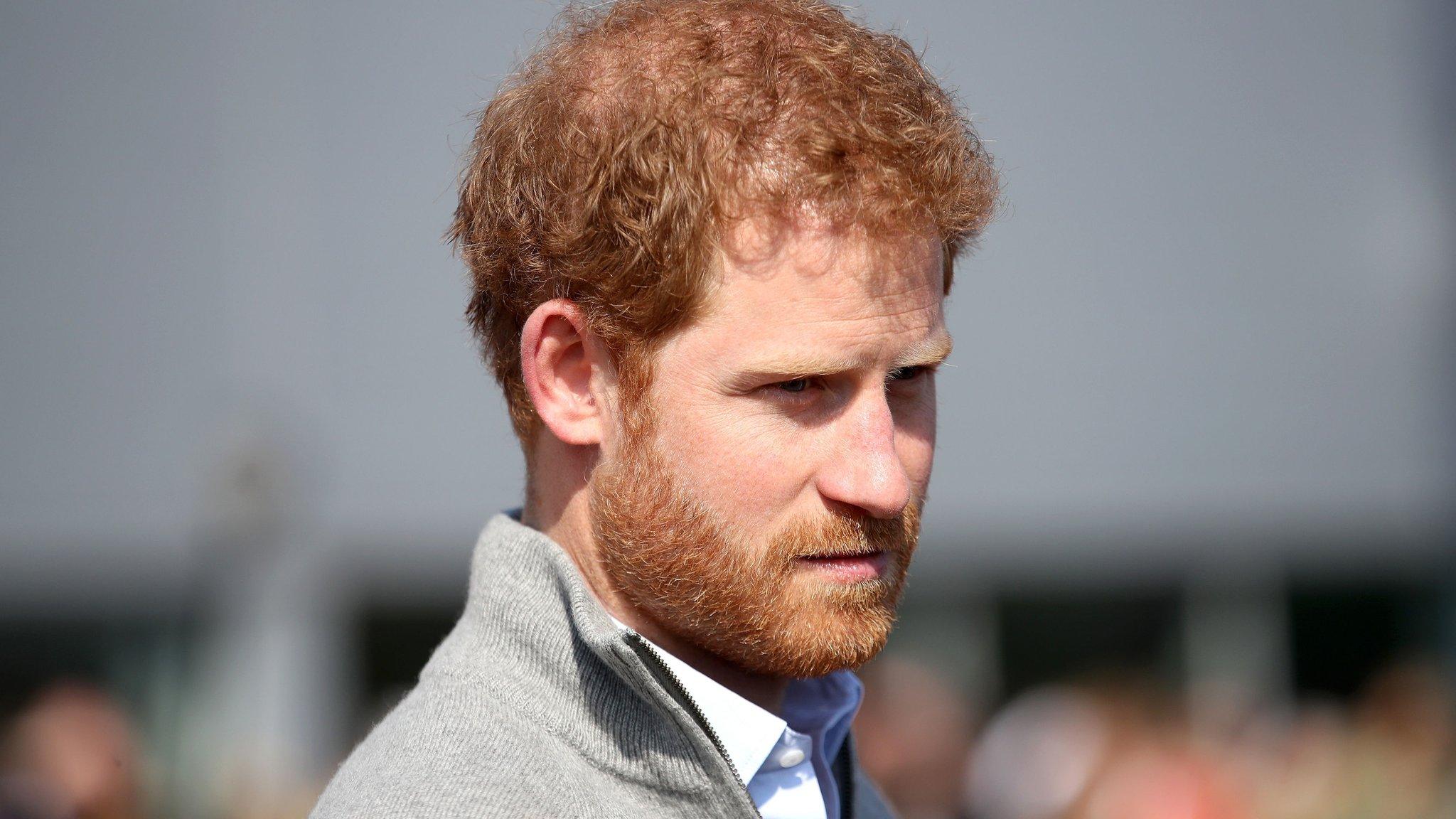
- Published6 March 2014
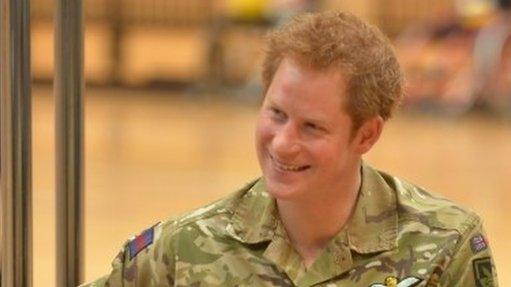
- Published19 June 2015
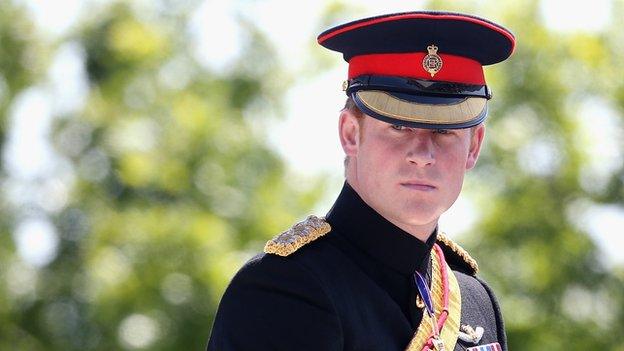
- Published6 June 2021
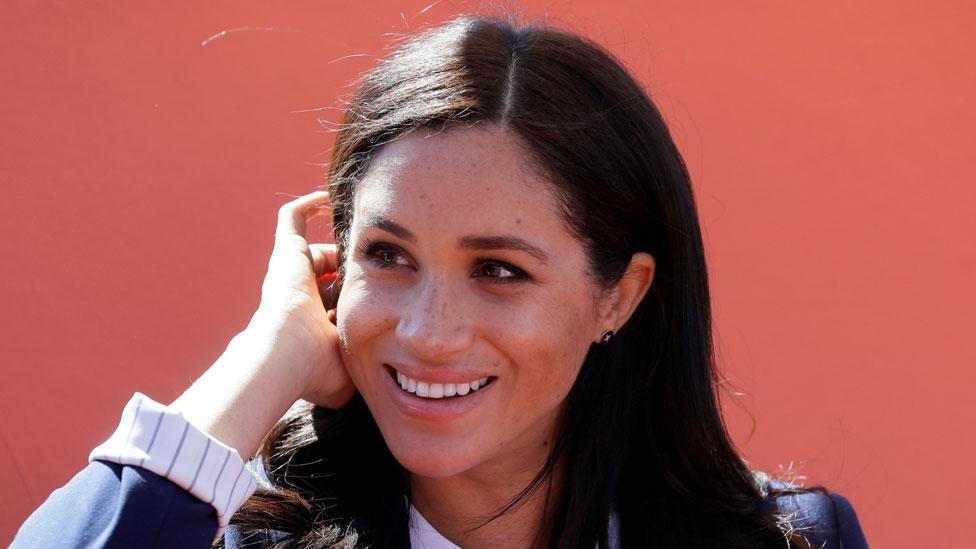
- Published14 July 2016
